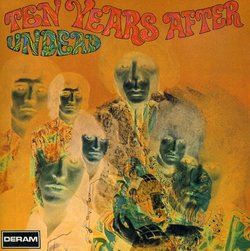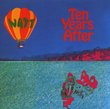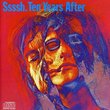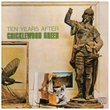| All Artists: Ten Years After Title: Undead Members Wishing: 2 Total Copies: 0 Label: Universal Japan/Zoom Release Date: 8/11/2009 Album Type: Import Genres: Rock, Classic Rock Styles: Blues Rock, British Invasion Number of Discs: 1 SwapaCD Credits: 1 |
Search - Ten Years After :: Undead
 | Ten Years After Undead Genres: Rock, Classic Rock
Japanese only SHM paper sleeve pressing. The SHM-CD [Super High Material CD] format features enhanced audio quality through the use of a special polycarbonate plastic. Using a process developed by JVC and Universal Music J... more » |
Larger Image |
CD DetailsSynopsis
Album Description Japanese only SHM paper sleeve pressing. The SHM-CD [Super High Material CD] format features enhanced audio quality through the use of a special polycarbonate plastic. Using a process developed by JVC and Universal Music Japan discovered through the joint companies' research into LCD display manufacturing SHM-CDs feature improved transparency on the data side of the disc allowing for more accurate reading of CD data by the CD player laser head. SHM-CD format CDs are fully compatible with standard CD players. 2009. Similar CDs
|
CD ReviewsAlvin Lee At His Very Best Ben | UK | 03/07/2009 (5 out of 5 stars) "Believe me, this was TYA recorded in top form live at the North London club, Klooks Kleek in 1968. I know many Americans believe that the performance at Woodstock was brilliant and Lee's best. But by that stage TYA had largely become 3 backing musicians massaging Alvin Lee's (by then) hugely inflated ego. His performance there was grossly overstated to the point of embarrassment, and alienated many of his Brit fans, myself included. But undeniably it did break TYA's career in the States if nothing else. Meanwhile just over a year earlier this album shows what Alvin Lee and the boys were really capable of. Here, TYA work as a serious jobbing band and not just there purely to showcase Alvin Lee's virtuosity on lead guitar, although naturally he's still the major focus. Then, Lee had a more modest stage personna, and allowed the other members to do more of their thing. Chick Churchill's fine playing on Hammond organ, and Leo Lyon's hard pumping bass result in a strongly jazz flavoured blues set. Both of these guys are given plenty of opportunity to solo, eg I May Be Wrong...and Woodchopper's Ball, two of the most jazz influenced numbers here. WB is a pure instrumental taken at breakneck speed, and Alvin Lee's playing is awesome the first few times you listen to it. Other highlights are, I can't Keep From Crying (not on the original album) and the controversial I'm Going Home. This is how it was normally played pre-Woodstock. Spider In My Web is a decent slow blues track, penned by Lee, whose limited vocal style is exposed here. But to be honest, Lee's vocals were never his strong point. There's no doubt that Alvin Lee was on fire that night, and sadly from '69 onwards, he never sounded as inspirational again. Those that accuse Lee of being a tasteless, cliché-ridden blues guitarist who could play fast had a point when I listen to his post '69 work. But Undead proves that before Alvin Lee got big-headed he was a guitarist to be reckoned with, and possibly more talented than most of his more famous white blues guitar peers around at that time.....Recommended especially for blues guitar fans. " Their Absolute Peak BluesDuke | Las Vegas, Nevada | 04/17/2010 (4 out of 5 stars) "Long after Ten Years After had run their course, Alvin Lee admitted that his happiest days in the quartet were when they played small clubs (such as London's Marquee, where this live set was recorded) or modest venues (such as Bill Graham's legendary Fillmores). It's not hard to understand why: the biggest break of their career (their incendiary appearance at the Woodstock festival and the film segment which turned them into superstars a year after the festival) may have turned out to be the biggest millstone around their neck, launching them toward the kind of large arenas that were a death sentence to many bands and an on-spot execution for a band whose forte wasn't exactly a motherlode of expansive musical or stage experimentation in the first place.
At the outset, Ten Years After was a welding of blues and jazz, the latter mostly hybridded between pure swing and hard bop (keyboardsman Chick Churchill was nothing if not a Jimmy Smith disciple, and leader Alvin Lee grew up listening as much to Django Reinhardt, Count Basie, and Benny Goodman as he did Big Bill Broonzy, his first pure blues influence), and as pyrotechnically proficient as he was pre-Woodstock Lee wasn't the entire show. If "Undead," their second and best album, does little else it should prove that all four musicians had above-average musical presence: Leo Lyons's strikingly fluid bass lines, drummer Ric Lee's smooth syncopations and tireless swing, underappreciated keyboardsman Churchill betraying no few influences from Smith and Wynton Kelly, and butterfingered Alvin showing as many traces of Wes Montgomery and Barney Kessell as Broonzy and T-Bone Walker. In fact, they could have issued side one of the original vinyl by itself and nailed a classic. Pairing a Count Basie/Jimmy Rushing chestnut ("I May Be Wrong, But I Won't Be Wrong Always," readapted from "Sent For You Yesterday" with the original composing credit handed erroneously to Alvin Lee, who made a point of introducing it as a Basie number on stage) with Woody Herman's longtime calling card ("Woodchopper's Ball"), Ten Years After shifts seamlessly from steady rolling blues as Art Blakey's Jazz Messengers might imagine it in the rhythm section, with Lee's clean guitar phrasing and Churchill's jabbing organ, to 78 rpm swing whose sleeper element just might be Lyons's skipping bass solo toward the amphetamine-fast finale, prior to which Lee peels off a series of whipsaw-staccato lines and Churchill rolls a rushing but oddly melodious organ solo. "Spider in My Web," which led side two of the original vinyl release, is a pretty routine blues ballad with ho-hum lyrics (not that lyrics were ever a Ten Years After's strength) but tasteful instrument work on all four sides (Lyons especially is effective here). "Summertime/Shantung Cabbage" a kind of obligatory excuse for a drum solo (by the time they played this date Cream's Ginger Baker had made drum solos de rigeur and, for better or worse, inspired only too many less imaginative percussionists to feature with them) that isn't bad but isn't revelatory, either, unless you want to credit Ric Lee with the mischieviousness needed to display one result might be if someone thought anything to do with Gershwin should be married to a drum exercise. And the original "I'm Going Home" isn't even close to the lightspeed rock and roll tributary it would become by the time of Woodstock---here, it's just an elemental blues swinging toddler who only hints at the machine-gunning adolescent that would turn Ten Years After from hard-working, jazzy bluesmen into reluctant and, ultimately, ill-fated rock superstars. If you want to hear Ten Years After right on the threshold of the Woodstock film breaking them big, and thus not yet crippled by the smothering impact of the large venues and comfort-zone playing they engaged to survive them, in a concert setting that wouldn't betray them, make way for "Ten Years After Live at Fillmore East 1970." (It's where you'll hear a far fuller and more playful take on "I Can't Keep From Crying, Sometimes," the Blues Project staple that became one of their most familiar concert jams, than what's added here.) It's as matured a Ten Years After as you're liable to hear without the pretenses of superstardom grinding away what made their reputation in the first place. But if you want to hear them at an absolute creative peak (adding "Rock Your Mama" and "Spoonful" neither helps nor harms the set, even if the former isn't a particularly clever B.B. King rewrite and Cream had the first and final word on reimagining the latter), "Undead"---and especially the first two selections---is the place to go. Both sets should stand as their truest musical legacy; both sets will stand as a kind of sad suggestion of what could have been for them. If there's truth in the idea that superstardom does as much harm as good to what makes the star in the first place, Ten Years After was one of the Woodstock Generation's signature examples." |

 Track Listings (5) - Disc #1
Track Listings (5) - Disc #1


